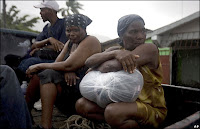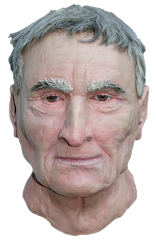 In the recent weeks news about hurricanes Gustav and Ike, floods in Bihar, attacks on Christians in the Indian state of Orissa, bomb blasts in New Delhi, plane crashes in Russia, mudslides in China, rockslides in Egypt have filled the air waves and used up much newsprint. What does all this say to me and to us?
In the recent weeks news about hurricanes Gustav and Ike, floods in Bihar, attacks on Christians in the Indian state of Orissa, bomb blasts in New Delhi, plane crashes in Russia, mudslides in China, rockslides in Egypt have filled the air waves and used up much newsprint. What does all this say to me and to us?I was left pondering the awesome and destructive power of the forces of nature, the indiscriminative targets of terrorists attacks and the very discriminative violence against an innocent minority people. It took me invariably to ponder the place of suffering in our lives. 

Some time agao i read an article by Kathleen A Brehony entitled "The good that can come from suffering." And as i read it again the other day it made som much sense all over again. I quote part of it below....
"Viktor Frankl (the author of the book, 'Man's Search For Meaning') survived the horrors of the Nazi concentration camps, including Auschwitz and Dachau. His mother, father, brother, and wife did not; they died in the camps or the gas ovens. Except for Viktor and his sister, Stella, the entire family perished. In an instant, his whole former, comfortable life as a doctor encircled by a loving family vanished. His every possession was taken from him and he suffered from hunger, cold, and brutal beatings. For more than three years, death surrounded him at every moment like a filthy shroud.
 Soon after entering the camps, Frankl realized that he had "nothing to lose but his ridiculously naked life." However, in spite of the pain and torture that he experienced, Frankl refused to relinquish his humanity, his love, or his sense of responsibility to bear witness to the world. In spite of the atrocities around him, he remained courageous and filled with hope. In choosing "to be worthy of suffering" Frankl was able to rise above his outward fate, by making inner, conscious decisions about how he would respond to his circumstances.
Soon after entering the camps, Frankl realized that he had "nothing to lose but his ridiculously naked life." However, in spite of the pain and torture that he experienced, Frankl refused to relinquish his humanity, his love, or his sense of responsibility to bear witness to the world. In spite of the atrocities around him, he remained courageous and filled with hope. In choosing "to be worthy of suffering" Frankl was able to rise above his outward fate, by making inner, conscious decisions about how he would respond to his circumstances. In his book Frankl gives testimony to the existential belief that life is filled with suffering and that the only way to survive is to find meaning in it. "Once an individual's search for meaning is successful, it not only renders him happy but also gives him the capability to cope with suffering," he wrote.

Although we cannot always change the fact that terrible things will happen to us, we have every power to change how we will respond to those painful events in our lives.
In his book, Frankl announces that he, himself, is filled with a "tragic optimism," a philosophy that allows him to say "yes" to life in spite of pain, suffering, and death. He has little patience with the nihilistic idea that being has no meaning and considers the common belief in that as a "mass neurosis." It is this philosophy, Frankl says, that served him in the camps and allowed him to maintain his dignity, grace, and compassion in spite of the unspeakable atrocities to which he was subjected. He holds that it is precisely man's search for meaning that is a primary motivation of our existence and one that gives us a reason to live in spite of life's tragedies.
 To Frankl, meaning can be found in the fact that human beings are self-determining. Although we cannot always change the fact that terrible things will happen to us, we have every power to change how we will respond to those painful events in our lives. We do not simply exist but have the intrinsic authority--this "last of human freedoms"--to decide what our existence will be, what we will become in the next moment."We must never forget that we may also find meaning in life even when confronted with a hopeless situation, when facing a fate that cannot be changed," he wrote. "For what then matters is to bear witness to the uniquely human potential at its best, which is to transform a personal tragedy into a triumph, to turn one's predicament into a human achievement. When we are no longer able to change a situation--just think of an incurable disease such as inoperable cancer--we are challenged to change ourselves."
To Frankl, meaning can be found in the fact that human beings are self-determining. Although we cannot always change the fact that terrible things will happen to us, we have every power to change how we will respond to those painful events in our lives. We do not simply exist but have the intrinsic authority--this "last of human freedoms"--to decide what our existence will be, what we will become in the next moment."We must never forget that we may also find meaning in life even when confronted with a hopeless situation, when facing a fate that cannot be changed," he wrote. "For what then matters is to bear witness to the uniquely human potential at its best, which is to transform a personal tragedy into a triumph, to turn one's predicament into a human achievement. When we are no longer able to change a situation--just think of an incurable disease such as inoperable cancer--we are challenged to change ourselves."











No comments:
Post a Comment